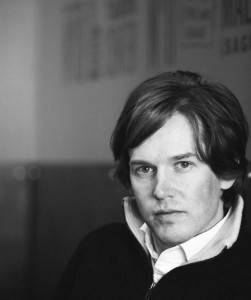Emilie Bluteau: When I read your story, His Son, for the first time I was struck by how intimate the story feels. Can you talk about that?
Marc Larock: If that was your impression, I’m really happy about that. Apart from exploring the concept of recovery, the story is about isolation. It’s also about other things, but isolation was the starting point for me. So I began with the idea of isolation and then I transitioned into the feel of isolation or, I suppose you could say, the phenomenology of isolation. That’s when I started thinking about the character himself. Things like his voice, his personal history, etc. The problem is that experiences vary between people. So, naturally, if you are going to have a sense of character, you have to have a sense of the way some experience, like isolation, feels to them. In so far as you can, I mean. A given experience will be different for everyone. These differences in experience are what I meant by the phenomenology of isolation or I suppose you could say, the phenomenal character of isolation. Basically, there’s something that it’s like to be isolated for X. And that’s what I tried to find. So basically I started with experience, raw feels, the what-it’s-likeness of someone’s inner life. And I suppose that’s why it feels intimate.
EB: Why did you start with isolation?
ML: Everyone’s isolated. And, I suppose, everyone wants a way out, most of the time anyway. There could be a love-hate relationship there. Basically I think that’s one of the things that makes us human. Even when you’re with someone else, you’re still isolated, you’re trapped in your own experience. I’m skeptical of real empathy. I don’t think it’s a pessimistic view that I have. I didn’t say there was anything wrong with that. I don’t think it makes us worse off or anything. It’s just the way we are.
EB: Going back to intimacy, do you think that intimacy is important in art generally speaking?
ML: I’d have to try and analyze the concept of intimacy just to make sure we’re even talking about the same thing, but a short answer would yes. I suppose that’s why I love so many of Octavio Paz’s poems. His poetry feels very intimate to me. You can’t help but feel sort of “spatially” oriented when you read many of them. You’re always oriented, again in this strange “spatial” way, to something else, like another space or some body or something. I love that.
An understanding of space, and I mean primarily empty space, like the space that separates us right now for example, is important in creating the kind of intimacy I think you’re talking about. Of course, I mean an understanding of the way empty space is used or abused by the artist. Even in painting, I think emptiness is important. Tony Scherman is an artist I really admire. He’s great at using emptiness and darkness. I think it’s amazing how his subjects just kind of float there. The same thing could be said for silence, especially in music. Le Poème Harmonique is a classical group that uses silence in really interesting ways. They’re great at creating very haunting music and, well, I guess you’d say a very intimate atmosphere. I certainly try to be aware of emptiness and silence in my writing. Short sentences, long pauses, breaths, the beating of a heart, I think all of those things help in creating empty space and silence. So, yes, that’s something I look for, something I try to create.
EB: In school you studied philosophy. What is the relationship between philosophy and fiction?
ML: Well, I suppose what interests me as a writer was influenced by my education. But I think that’s pretty trivial. I don’t do philosophy anymore. I have nothing more to say about that subject. You know, I teach it, but that’s my job.
On a deeper level, I see a connection between good philosophical prose and good literary prose. In philosophy, the concepts you deal with are already so complex that you shouldn’t muck them up with convoluted writing. You should just say what you need to say in the most economical and precise way possible. If you think the concept of betterness is transitive, just say it. That’s what I tell my students.
And I suppose this ties in with trying to capture experience. If I’m thinking about what it’s like to experience a stop sign by looking at it, I have no sense of the experience of a semicolon there. It’s red and that’s it. So, how do you communicate that? Red. Perhaps some other things too. Unfortunately you can’t do away with grammatical conventions completely, but you can do your best.
EB: Who are your favorite writers?
ML: Raymond Carver is a god. The reason stems from how he treats me as a reader. Carver strikes me as a visceral writer and I love that. I had an interesting chat with David Wroblewski about the reader once. He thinks about the reader like those Russian stacking dolls you’ve seen. I liked that idea because it can explain what the best writers do in my opinion. The main point is that it’s the inner “doll,” the inner layer of the reader, that is the most important. I think Carver is a master at speaking to that inner aspect of the reader. So, then, what’s this inner aspect, you might ask?
Well, I have my own opinion on that. I think it’s something vaguely similar to what Freud called the id. It’s that inner source of basic animal drives. It’s fear and chaos. I think Carver can speak to that aspect of a reader like nobody else.
Other favorites on the list are definitely Andre Dubus, Tobias Wolff, Cormac McCarthy, Ernest Hemingway, Annie Proulx, Thom Jones, Jayne Anne Phillips, Isaac Babel, Nick Arvin, and Ron Hansen. I’ll always have a soft spot for John Updike and Albert Camus, but I don’t read them much anymore. As for poets, probably, Rimbaud, Whitman, Paz, Strand. Some poems by Charles Wright really do something to me as well. And Shakespeare of course. Who doesn’t love Shakespeare?
Emilie Bluteau is a chef and caterer. She loves old books, good food, traveling, and reading.



Pingback: His Son | Rkvry Quarterly Literary Journal
Pingback: “His Son” by Marc Larock | Rkvry Quarterly Literary Journal